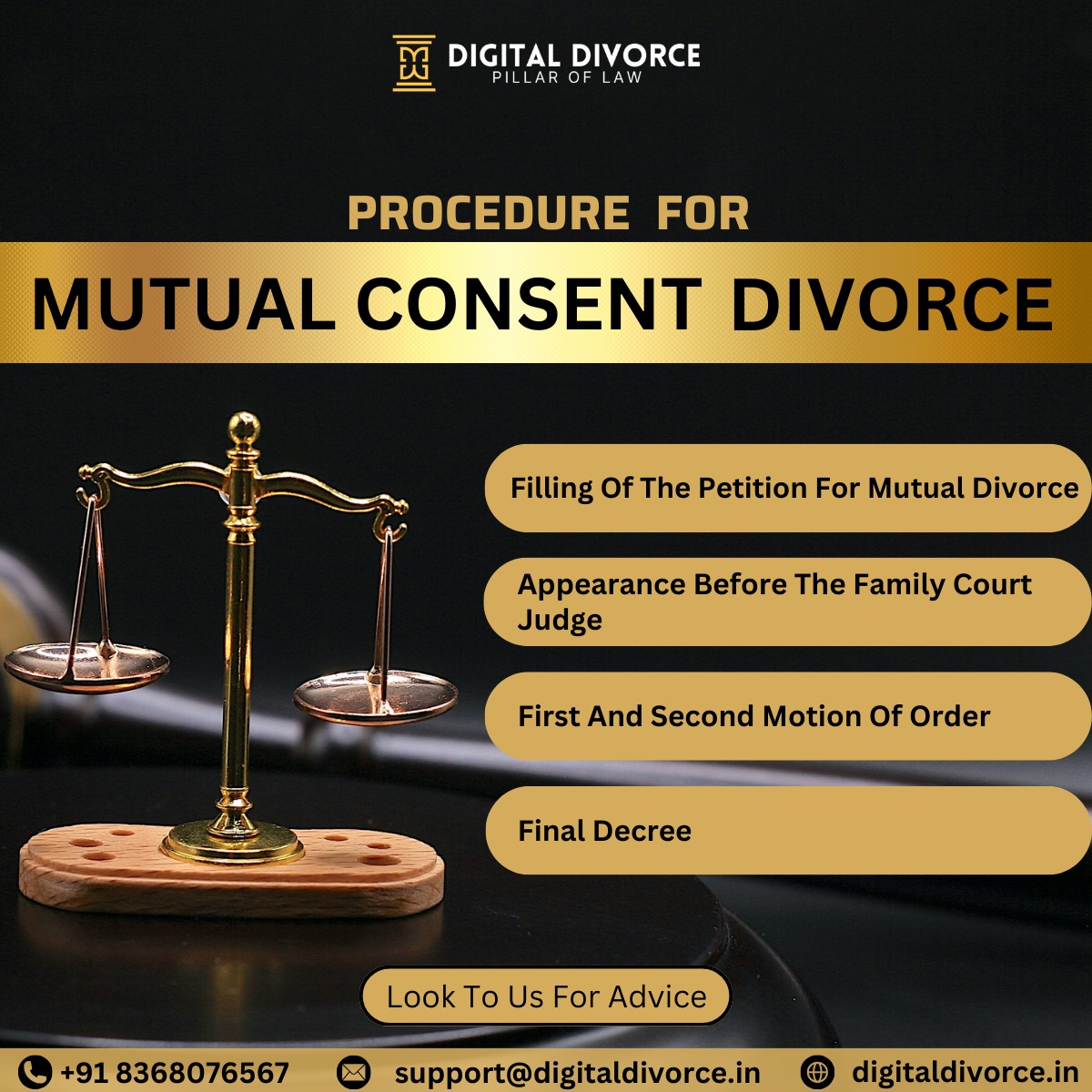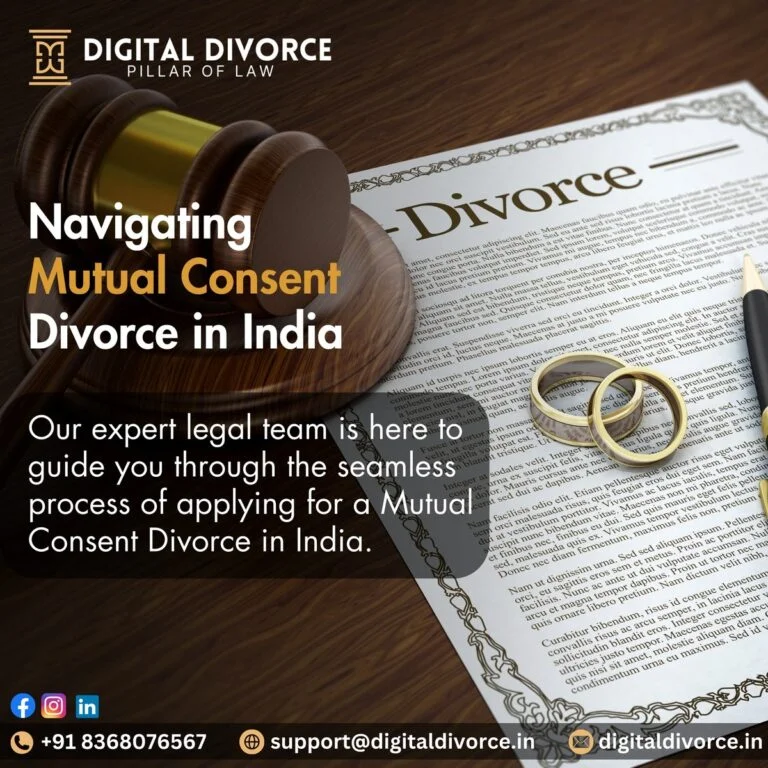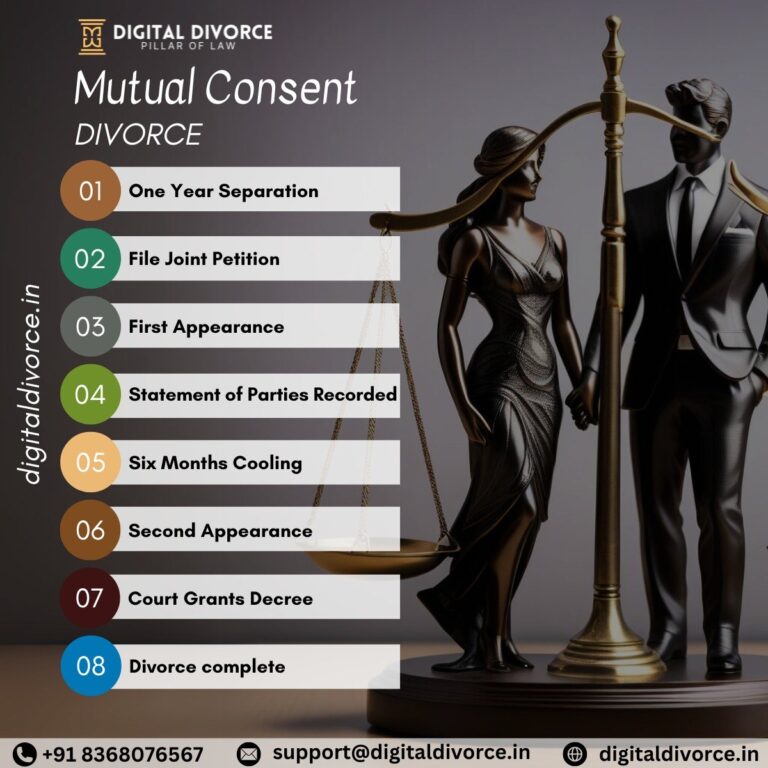Introduction:
Mutual Consent Divorce allows married couples to dissolve their marriage amicably in India. It requires spouses to agree, live separately for at least a year, and file a joint petition with the court. This is a faster option compared to contested divorces. Mutual consent divorce is a faster option in India compared to other divorce methods, and applies to marriages performed before or after 1976, as long as both spouses agree before a judge.
Requirements for a Mutual Consent Divorce In India
- The requirement of one year of separate living between the parties raises questions regarding whether it must be voluntary or due to external circumstances.
- However, as long as the parties are living separately, either in the matrimonial house or in separate dwellings, it seems unnecessary for the Court to delve into the specifics of the separation.
- The Court should adhere to its statutory jurisdiction and refrain from exceeding its limits unless there is evidence of force, fraud, or undue influence affecting either party’s consent to the petition.
- If the parties are unable to coexist for any reason and there is no room for compromise, dissolution of the marriage may be pursued.
- The agreement for dissolution must be based on the voluntary consent of both parties.
- The petition may be withdrawn by either party at any time, and it appears that withdrawal is possible even within six months of the petition’s presentation.
- However, the unilateral power of a party to withdraw the petition may be restricted if a joint resolution is reached between the parties after six months but before eighteen months from the petition’s presentation for inquiry.
Mutual Divorce Process on digitaldivorce.in: A Step-by-Step Guide
Initiating the Process:
- File a Joint Petition: Start by submitting a petition to the family court, signed by both spouses. This petition outlines your agreement to divorce and includes details on property division and child custody (if applicable). We recommend seeking legal guidance before filing.
- Court Appearances: Attend court hearings as instructed by the judge. These may involve attempts at mediation or verification of your petition.
Moving Towards Resolution:
- Statement Recording: The court will record sworn statements from both parties to confirm your understanding and consent.
- Cooling-Off Period: A mandatory waiting period of six months follows (may be waived by the court). During this time, reconciliation is still possible.
- Second Motion: If reconciliation fails, appear for the final hearing and record your statements again.
Reaching a Conclusion:
- Court Decree: Upon satisfaction, the court will grant a mutual divorce decree, finalizing the separation.
DigitalDivorce.in Can Help:
- Our platform connects you with experienced divorce lawyers who can guide you through each step of the mutual consent divorce process in India.
Concise List Of Mutual Divorce Documents: Checklist
• Proof of Identity and Residence: Both spouses will need to submit documents that verify their individual identities and current addresses. This could include Aadhar cards, passports, voter IDs, or utility bills.
• Marriage Certificate: A certified copy of your marriage certificate is essential to establish the legitimacy of the union.
• Financial Information: Documentation related to your income and employment details might be required. This could include salary slips, income tax returns, and bank statements.
• Proof of Separation: To satisfy the one-year separation requirement, you may need documents that demonstrate you and your spouse have been living apart. Examples include rental agreements, lease documents, or evidence of separate residences.
• Asset and Property Details: Information regarding jointly owned assets and individual properties is often required. This could include ownership documents, investment records, and details about debts or liabilities.
• Photographs: While not always mandatory, some courts may request wedding photographs or pictures showcasing you both as a married couple.
• Agreement on Related Issues (Optional): If you’ve already reached agreements on child custody, spousal support, or division of assets, including a documented memorandum of understanding (MOU) can expedite the process.
• Additional Documents: Depending on the specific circumstances of your case, the court may request further documentation. This could include evidence of failed reconciliation attempts (if any) or tax-related documents.
Advantages Of Mutual Divorce: Fast & Amicable Separation
Mutual consent divorce offers a multitude of benefits for couples who have chosen to amicably end their marriage. Here’s why it stands out:
- Reduced Time and Cost: Compared to contested divorces, mutual consent is significantly faster and less expensive. You can avoid lengthy court battles and associated legal fees.
- Lower Stress: By eliminating blame and accusations, mutual consent fosters a more civil and less stressful environment throughout the process.
- Flexibility and Control: Couples have the freedom to reach agreements on related issues like child custody and property division outside of court, allowing for more control over the outcome.
- Faster Resolution: The streamlined process typically leads to a quicker divorce decree, enabling you to move forward with your lives sooner.
- Simpler Process: Mutual consent avoids the complexities of contested divorces, making it a more straightforward and easier experience for all parties involved.
Here Is A Path To Move Forward With DigitalDivorce.in
Marriage and divorce are significant life events, and Indian law recognizes the need for a legal framework that adapts to evolving social realities. Mutual consent divorce offers a dignified and amicable solution for couples who have chosen to end their marriage.
DigitalDivorce.in understands that even an amicable divorce can raise questions and require guidance. That’s why we connect you with experienced divorce lawyers who can provide tailored support throughout the process. Ready to take the first step?




